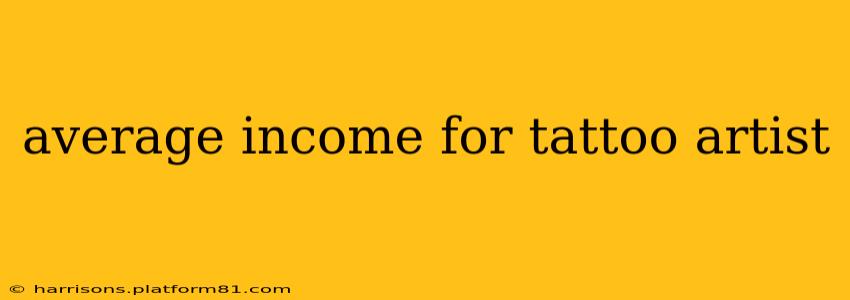The question of "what is the average income for a tattoo artist?" doesn't have a single, straightforward answer. Earnings vary dramatically based on several key factors, including location, experience, skill level, specialization, clientele, and business model (e.g., working in a shop versus independently). This guide delves into these factors to give you a more nuanced understanding of potential tattoo artist income.
What is the average hourly rate for a tattoo artist?
Hourly rates for tattoo artists are highly variable. A newly licensed artist working in a busy shop might start at a lower rate, perhaps $25-$40 per hour, while a highly experienced and sought-after artist with a strong portfolio and established clientele could command $100-$200 or more per hour. The rate often depends on the complexity and size of the tattoo as well. A small, simple tattoo will naturally take less time than a large, intricate piece.
What is the average yearly salary for a tattoo artist?
Translating hourly rates into yearly salaries is challenging due to the inconsistent nature of hourly earnings. A full-time tattoo artist with a consistent client base and strong pricing could potentially earn $40,000 to $80,000 annually. However, highly successful artists can significantly exceed this range, earning six-figure incomes. Conversely, artists with less experience or those who struggle to maintain a steady client flow might earn less.
What are the factors affecting a tattoo artist's income?
Several key factors significantly influence a tattoo artist’s income:
Experience and Skill:
This is arguably the most significant factor. Experienced artists with proven skills, a distinct style, and a strong reputation command higher prices. Building a strong portfolio and mastering various tattoo styles takes time and dedicated practice.
Location:
High-cost-of-living areas generally correlate with higher tattoo prices and, consequently, higher potential earnings for artists. However, competition for clients can also be more fierce in these locations.
Specialization:
Artists who specialize in specific styles (e.g., realism, watercolor, traditional) or techniques (e.g., large-scale pieces, fine line work) can often command higher rates. This specialization attracts a niche clientele willing to pay a premium for expertise.
Client Base and Reputation:
Building a strong client base through word-of-mouth referrals, social media marketing, and consistently high-quality work is crucial. A positive reputation and strong online presence attract more clients and justify higher prices.
Business Model:
Working in a well-established tattoo shop often provides a steadier income stream and built-in clientele, while independent artists might experience more income variability but retain a larger share of their profits.
How can a tattoo artist increase their income?
Several strategies can help tattoo artists boost their income:
- Develop specialized skills: Mastering a unique style or technique can set you apart.
- Build a strong online presence: Utilize social media platforms like Instagram to showcase your work and attract clients.
- Network with other professionals: Collaborate with other artists and businesses to expand your reach.
- Offer diverse services: Consider offering additional services, such as piercings or custom design consultations.
- Implement effective pricing strategies: Carefully assess your time, skill, and the cost of materials when setting prices.
- Maintain excellent customer service: Positive reviews and word-of-mouth referrals are invaluable.
Is tattoo artistry a lucrative career?
The potential for a lucrative career in tattoo artistry is real, but it requires dedication, talent, and a strategic approach to building your business. While the average income might vary greatly, successful artists demonstrate that it's a field with significant earning potential. However, it's crucial to acknowledge the hard work, competition, and continuous learning required to thrive in this industry.
This detailed analysis provides a much more realistic picture of earning potential compared to a simple average income figure, highlighting the numerous factors that contribute to the success and profitability of a tattoo artist’s career.
